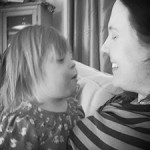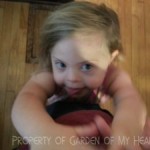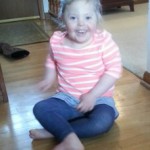I recently had the pleasure of reading The Parent’s Guide to Down Syndrome. (Amazon link here.)
Full disclosure: when I first heard this project was under way, I was side-eyeing the heck out of it. Did we really need another book to give to new families? Didn’t we all get that one book at diagnosis, page through it, freak out a little, then put it on the bookshelf to “read later” while it collected dust?
Extra full disclosure: I contributed a teeny, tiny bit to this book.
But when I found out who would be at the helm of this project, Jen Jacob (one of the Down Syndrome Diagnosis Network founders) and Mardra Sikora (advocate and writer extraordinaire), I was relieved. This would not be another chapter by chapter run down of all the stuff that can go wrong, all the stuff to worry about.
The book is a quick read and easy to navigate. You can read just as far as you would like without the feeling that you might be missing something important if you skip chapters that don’t pertain to you quite yet. Chapters include multiple resources, ranging from online support forums to tips for finding a local, in-person parent group to advocacy information.
It follows the natural timeline from diagnosis through adulthood. It discusses everything from the fun (World Down Syndrome Day activities) to the difficult (parental estate planning).
The tone is a bit chipper, but I don’t mind much. The resources we received with Rowenna’s diagnosis were so…defeated. Their tone was “love your child despite all this stuff.” This book clearly sends the message that Ds is ok, no matter how it affects your child, and the love you feel is natural and not “despite” anything.
The conversational tone allows for two of its best features: anecdotes directly from individuals with Down syndrome and anecdotes from parents. The anecdotes from people with Ds is a refreshing change. Too often, resources are for parents, by parents without perspective from anyone actually living with Down syndrome. Hearing about life with Ds from people who actually have it is an incredible resource not just for brand new parents, but for anyone raising or supporting an individual with Down syndrome. This book in the hands of so many new parents could help a great deal in planting the seed that people with Down syndrome have a voice and we need to listen.
The parental anecdotes were especially fun for me to read because I recognized so many of my fellow parents. These are people I know through my online Ds family, and it was fun to hear their perspectives on Down syndrome when we so often just shoot the breeze about anything but that. In this way, the book reads like a dinner out with my local mom’s group. Someone asks a question and we all respond with our varying answers – different from each other, yes, but grounded firmly in the knowledge that we respect each other’s parenting and we are all just doing our best.
The variety of voices and perspectives was astounding, and gathering everyone’s words was truly a labor of love. I feel that no matter how unique a family’s situation may be, they will find at least one familiar voice among the chorus in this book.
Overall, the book is a judgement free zone that offers a wide variety of options and ideas to families. No one way is presented as the right way. No advice to do a million hours of therapy, no advice to push supplements. Just a great deal of information, anecdotes, and space for each family to choose the right path for them.
My only disappointment in the book is that it doesn’t really touch on autism/dual diagnosis at all. Current research suggests that autism affects a minimum of 10% of people with Down syndrome, with even more exhibiting autism-like behaviors and needs that respond well to autism interventions. In a book absolutely jam-packed with resources, this feels a bit like a misstep. I was blind-sided by the possibility of autism when Rowenna started exhibiting signs – I can’t think of a single general Ds book I’ve read that covered it – so in a book that explains even the difference between the possible high school diplomas available, it would have been nice to see a little something more about this.
I would also have loved to see a bit more about the wide range of communication ability that comes with Down syndrome. (If I missed these items in the book, please let me know and I will amend this part of my review along with a full apology.)
This book is excellent. It speaks to so many of the questions and concerns common to us parents and provides a variety of viewpoints and resources to help parents navigate. I would recommend this book for parents as well as other care givers, and it would be appropriate to bring to genetic counselors, obstetricians, and any other medical professionals who deliver a Down syndrome diagnosis. It would also make a great addition to new parent kits handed out by local parent groups.
Thank you, Jen and Mardra, for this gift to the parenting community. And thank you, so very much, for grounding parent perspectives with those of people who have Down syndrome themselves.







One Response to Book Review: The Parent’s Guide to Down Syndrome